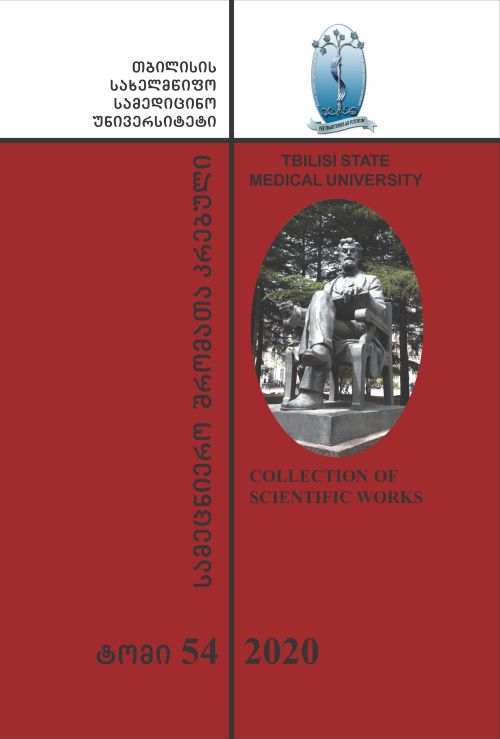Аннотация
Diabetes mellitus is one of the most common chronic disease. In a number of developing and industrialized countries, diabetes mellitus has become an epidemic and is one of the leading causes of death. The rapid increase of cases of type 2 diabetes mellitus (T2DM) in the past decades has made it a widespread metabolic disorder. In recent years, an increasing understanding of how our microflora is linked to obesity-related T2DM has provided a new potential target for reducing the risk of T2DM.The aim of our project is to expand our view on the key roles of microflora during the onset and development of T2DM as well as its complications. Our aim wasto study 2 groups of people with T2DM and Prediabetes in order to reveal any gastro-intestinal problems. According to questionnaires, it appeared that patients with diabetes type 2 had 3 or more gastrointestinal disorders, 72 % had bloating, 16% constipation and 12% diarrhea. Patients with prediabetes had 3 and more intestinal disorders: 56 % had bloating, 23% constipation and 21 % diarrhea. Despite, multiple studies supporting the importance of gut microbiota in pathophysiology of T2DM, the field is in early stage. Currently, we have reached a point in our understanding that some probiotics and related molecular mechanisms may be involved in glucose metabolism related to T2DM. We should work towards precision/personalized medicine selecting anti-diabeticsand probiotics for a given patient to treat patients successfully.
Библиографические ссылки
Everard A, Cani PD. Diabetes, obesity and gut microbiota. Best Pract Res Clin Gastroenterol. 2013 Feb;27(1):73-83. doi: 10.1016/j.bpg.2013.03.007. PMID: 23768554.
Liou AP, Paziuk M, Luevano JM Jr, Machineni S, Turnbaugh PJ, Kaplan LM. Conserved shifts in the gut microbiota due to gastric bypass reduce host weight and adiposity. Sci Transl Med. 2013 Mar 27;5(178):178ra41. doi: 10.1126/scitranslmed.3005687. PMID: 23536013; PMCID: PMC3652229.
C.N. Lumeng, A.R. Saltiel, Inflammatory links between obesity and metabolic disease, Journal of Clinical Investigation 121 (2011) 2111–2117.
E. Naito, Y. Yoshida, K. Makino, et al., Beneficial effect of oral administration of Lactobacillus caseistrain Shirota on insulin resistance in diet-induced obesity mice, Journal of Applied Microbiology 110 (2011) 650–657.
F. Calcinaro, S. Dionisi, M. Marinaro, et al., Oral probiotic administration induces interleukin-10 production and prevents spontaneous autoimmune diabetes in the nonobese diabetic mouse, Diabetologia 48 (2005) 1565–1575.
F.C. Hsieh, C.L. Lee, C.Y. Chai, et al., Oral administration of Lactobacillus reuteriGMNL-263 improves insulin resistance and ameliorates hepatic steatosis in high fructose-fed rats, Nutrition & Metabolism 10 (2013) 35
H.S. Ejtahed, J. Mohtadi-Nia, A. Homayouni-Rad, et al., Probiotic yogurt improves antioxidant status in type 2 diabetic patients, Nutrition 28 (2012) 539–543.
H. Panwar, H.M. Rashmi, V.K. Batish, et al., Probiotics as potential biotherapeutics in the management of type 2 diabetes – prospects and perspectives, Diabetes/Metabolism Research and Reviews 29 (2013) 103–112
Tilg H, Kaser A. Gut microbiome, obesity, and metabolic dysfunction. J Clin Invest. 2011 Jun;121(6):2126-32. doi: 10.1172/JCI58109. Epub 2011 Jun 1. PMID: 21633181; PMCID: PMC3104783.
IDF atlas 2019
Amar J, Chabo C, Waget A, Klopp P, Vachoux C, Bermúdez-Humarán LG, Smirnova N, Bergé M, Sulpice T, Lahtinen S, Ouwehand A, Langella P, Rautonen N, Sansonetti PJ, Burcelin R. Intestinal mucosal adherence and translocation of commensal bacteria at the early onset of type 2 diabetes: molecular mechanisms and probiotic treatment. EMBO Mol Med. 2011 Sep;3(9):559-72. doi: 10.1002/emmm.201100159. Epub 2011 Aug 3. PMID: 21735552; PMCID: PMC3265717.
Ncdc.ge
Mu Q, Tavella VJ, Luo XM. Role of Lactobacillus reuteri in Human Health and Diseases. Front Microbiol. 2018 Apr 19;9:757. doi: 10.3389/fmicb.2018.00757. PMID: 29725324; PMCID: PMC5917019.




